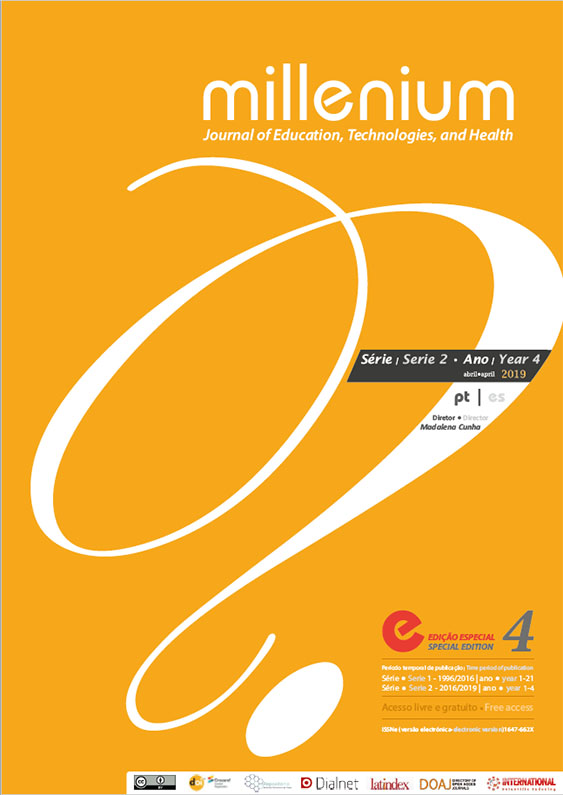Educational collaboration as a means to foster authentic learning and enhance employability
DOI:
https://doi.org/10.29352/mill024e.15120Keywords:
collaboration, competences, English language, heritage, interpretationAbstract
Introduction: The need to prepare higher education students to face the job market makes it crucial to develop real world and hands-on activities. It is also important to consider the mobility between companies and countries, which makes students’ career path unpredictable. Thus, the teaching-learning process should be multidirectional, with a concern to provide tools and information sources that can be used in knowledge construction.
Objectives: To stimulate interinstitutional collaboration; Foster situational and communicational authenticity through real activities of interpretation of local heritage through guided tours; Improve the quality of outputs produced by students; identify students' perceptions after carrying out the activity.
Methods: This is a collaborative project carried out within English language courses with students from two higher education degrees in different cities. The project encompassed a preparation phase, drawing a script with the main points of interest of their cities. After the elaboration of interpretive scripts and at the end of the experience of conducting the guided tour, the students answered an anonymous questionnaire where they expressed their perceptions.
Results: From the final SWOT analysis it was verified that, among other aspects, one of the strengths of this methodology is the preparation for future activities with real audiences; one of the weakest points was the perception of insecurity before the real groups; the threats are centered, among other aspects in the group of visitors, and the identified opportunities refer mainly to the positive experience to face the labor market.
Conclusions: The development of interinstitutional collaborative activities was relevant for students, especially in the perspective of preparation for similar situations in the labor market.
Downloads
References
Adelman, C. (1993). Kurt Lewin and the origins of action research. Educational Action Research, 1(1), 7-24.
Coutinho, C., Sousa, A., Dias, A., Bessa, F., Ferreira, M. & Vieira, S. (2009). Investigação-acção: metodologia preferencial nas práticas educativas. Psicologia, Educação e Cultura, XIII(2), 455-479.
Mills, G. (2010). Action Research. A guide for the teacher researcher. London: Pearson.
Siemens, G. & Tittenberger, P. (2009). Handbook of Emerging Technologies for Learning. Disponível em http://techcommittee.wikis.msad52.org/file/view/HETL.pdf
Tudor, I. (2005). Higher Education language policy in Europe: A snapshot of action and trends [Discussion brief posted on the website of Task Group 1, Institution wide language policies, of the ENLU website].
Disponível em http://web.fu-berlin.de/enlu/
Wills, S., Leigh, E. & Ip, A. (2011). The power of role-based e-learning. New York: Routledge.
Wills, S., Rosser, E., Devonshire, E., Leigh, E., Russel, C., & Shepherd, J. (2009). Encouraging Role Based Online Learning Environments by Building, Linking, Understanding, Extending: the BLUE Report. Australian Teaching and Learning Council. Disponível em http://ro.uow.edu.au/cgi/viewcontent.cgi?article=1114&context=asdpapers
Downloads
Published
How to Cite
Issue
Section
License
Copyright (c) 2019 Millenium - Journal of Education, Technologies, and Health

This work is licensed under a Creative Commons Attribution 4.0 International License.
Authors who submit proposals for this journal agree to the following terms:
a) Articles are published under the Licença Creative Commons (CC BY 4.0), in full open-access, without any cost or fees of any kind to the author or the reader;
b) The authors retain copyright and grant the journal right of first publication, allowing the free sharing of work, provided it is correctly attributed the authorship and initial publication in this journal;
c) The authors are permitted to take on additional contracts separately for non-exclusive distribution of the version of the work published in this journal (eg, post it to an institutional repository or as a book), with an acknowledgment of its initial publication in this journal;
d) Authors are permitted and encouraged to publish and distribute their work online (eg, in institutional repositories or on their website) as it can lead to productive exchanges, as well as increase the impact and citation of published work
Documents required for submission
Article template (Editable format)





